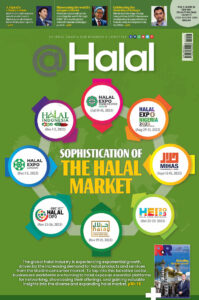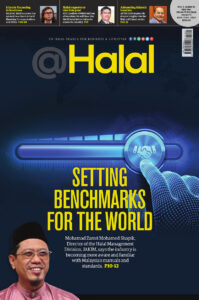It can be used as a verification tool to assist in certifying halal products
Data science could be an essential part of the fast-growing halal industry by helping businesses improve their processes, learn more about their customers, and make sure their products are genuine as it is claimed.
Data science, through its machine learning algorithms, also provides valuable insights and accurate predictive models and assists companies in making decisions.
To fulfil halal certification requirements, data science evaluates the gap between the status quo of the companies against the halal requirements, improves how the supply chain works, gives customers a better experience and ensures the halal assurance system is in place. Allah said in the Quran:
“And give full measure when you measure, and weigh with an even balance. That is the best [way] and best in result” [Q. Al-Isra’, 17: 35]
Allah has instructed us that we carry out activities with precision and accuracy. More so, practising precision and accuracy in matters involving halal products and services is paramount. This article examines four ways in which data science is used in the halal industry in the following areas:
• halal certification,
• consumer opinions and insights,
• supply chain optimisation, and
• food fraud
Halal certification
In halal certification, companies must show that their ingredients and manufacturing processes comply with Islamic law. Five halal supply chain components in halal-certified products are routinely checked: product ingredients, production, packaging, storage, and transportation.
This certification process can be lengthy and costly since it requires physical inspections and paperwork.
So, how can data science assist in halal certification? The application of data science as a verification tool assists in certifying halal products. Based on the chemical composition of ingredients like alcohol, pork, or gelatin, companies could train machine learning algorithms to spot these non-halal ingredients in products.
These algorithms evaluate big data from databases with information about suppliers, production processes, and reports from laboratory testing to ensure the ingredients used meet the halal standards.
Halal Certification Bodies (HCBs) can adopt this initiative to collate databases from all companies applying for halal certification and divide the database into successful versus rejected applications. Further investigation of the rejected applications may provide details on the potential halal toyyiban threats from various sources.
This includes incomplete information on the ingredient status, doubtful ingredient and flow of the manufacturing process, fake halal certificate issuance and halal certificate issuance from unrecognised HCB.
Using data science in this sense would prevent the recurrence of non-halal products claimed to be halal. Such information, like the issue of meat cartels, can be added as part of the database to enable data science to identify the possibility of its recurrence.
Consumer opinions and insights
Companies must understand people’s behaviours and preferences to create effective marketing strategies and products that meet customer needs. Data science analyses social media, online reviews, and survey data to understand human behaviour.
Facebook, Twitter, and Instagram are good sources of information because customers can provide feedback and opinions in real-time. Data science could determine halal food and product preferences by analysing hashtags, keywords, and feelings in social media posts.
Reading online reviews can also reveal customer preferences. Data science evaluates reviewers’ topics, complaints, and ratings to improve products and meet customer needs and demands. Data science analyses survey data like consumers’ demographics, buying habits, preferences, behaviour and satisfaction to enhance marketing campaigns and customer satisfaction.
However, online reviews collected from shopping applications such as Shoppe and Lazada are preferable to the survey since the former manages information on customer satisfaction after purchase.
The machine learning finds patterns from the reviews and surveys by improving predictive models using regression models, decision trees, and neural networks to predict future consumers purchasing preferences and assists companies’ decisions and operations.
Optimisation of the supply chain
To ensure on-time, in-tact delivery, companies must prioritise supply chain optimisation. Adopting the application of data science in business operations improves the supply chain by collecting and analysing quality control, logistics and inventory data.
Quality control activity gathers data to improve product quality and reduce contamination in halal-certified products and services. Data science analyses inspections, reports from laboratory testing, and customer complaints to identify potential halalan toyyiban threats along the supply chain.
This identification involves gathering data during processing, packaging storage and transportation, which covers the traceability requirement outlined in the halal assurance system. The compiled data is saved as a database, and the machine learning algorithm could identify the potential halalan toyyiban threats when unusual information against the database is found; hence, it suggests the possible root cause.
Companies could proceed with corrective action, verify the root cause of the halalan toyyiban threats and prepare preventive measures to avoid the recurrence. As the database information increases and advanced machine learning algorithms are used, data science may propose corrective and preventive measures for the company’s operations.
Data science also assists in optimising transport and delivery times by analysing logistics data, Global Positioning System (GPS), traffic conditions, and weather data to find the fastest and cheapest routes. Inventory management data helps maximise stock and minimise waste. Data science also facilitates determining product stock levels by analysing sales, production, and lead times.
Furthermore, data science analyses supply disruptions, natural disasters, and geopolitical risks to help the industry run and minimise losses. This application has been proven to be effective during the Covid-19 pandemic.
Data science supports new technology in the supply chain, like the ‘digital twins’ technology, where it provides insights and solutions for different parts of its development and deployment. The digital twin technology replicates a real-world product, system, or process used for simulation, integration, testing, monitoring, and maintenance.
Data science can be used to prepare data from various sources, such as Internet of Things (IoT) sensors, historical data, and simulation results, to make digital twins. It also helps monitor and analyse performance, predict maintenance, and make decisions to improve digital twins’ accuracy, efficiency, and effectiveness.
Food fraud
Food fraud involves altering or misrepresenting food products for profit. Data science combats food fraud by analysing large amounts of data from many sources to find fraud patterns and outliers. These patterns and outliers include unusual ingredient combinations or inconsistent labelling.
The machine learning algorithms will be trained against these data to find patterns and outliers. For instance, data scientists search social media data for food fraud and other suspicious activities, allowing companies to spot issues early before it spreads, thus protecting the food supply.
Halal and non-halal food results from the reports from halal laboratory testing can also be used to establish a halal food database. Database from DNA, amino acids, fatty acids and their esters etc., are abundant for this purpose. Shared database among accredited laboratories, especially enforcement laboratories, would allow the application of predictive modelling to curb food fraud.
From the result of predictive modelling, data scientists can identify risk factors contributing to the contamination and the traceability breach. Hence, the HCB and enforcement agencies could prevent food fraud from spreading.
Conclusion
Data science can help halal companies improve their operations, products, and customer service. Also, using data science, the halal certification bodies and enforcement agencies could effectively enhance their monitoring of the status of halal-certified products.
With all these benefits of data science, it is time that all stakeholders embrace this advanced technology to support and enhance the halal industry.
By Muhamad Shirwan Abdullah Sani and Noor Faizul Hadry Nordin, International Institute for Halal Research and Training (INHART), International Islamic University Malaysia (IIUM).








